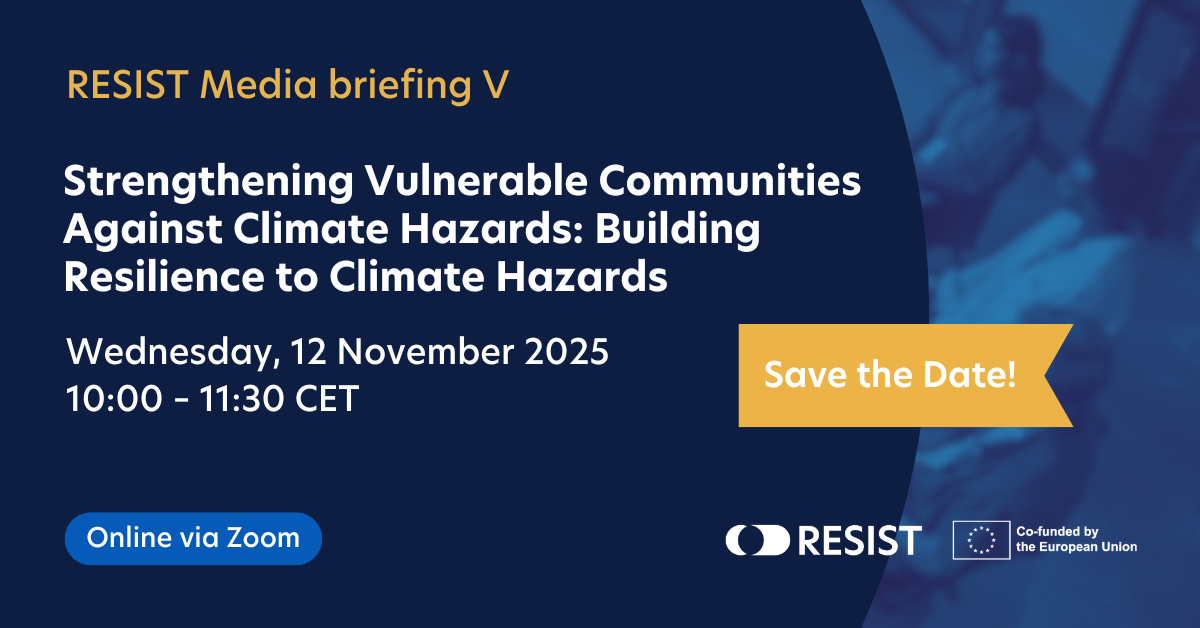The RESIST Project recently held its fifth media briefing, focusing on how vulnerable communities across Europe are living through and adapting to the growing impacts of climate change. Speakers from the European Environment Agency (EEA), the Open University of Catalonia and RESIST’s coordination team provided insights into just resilience, citizen participation, and the importance of inclusive adaptation strategies.
Understanding Just Resilience in European Climate Policy
Terry Karampini from the European Environment Agency opened the session by presenting findings from the Agency’s latest work on social fairness in climate adaptation. She explained that although Europe increasingly recognises that climate hazards affect people unequally, adaptation measures themselves can deepen inequalities if they are not designed with justice in mind or even create new instances of inequality
Socially vulnerable groups, such as older adults, children, outdoor workers and people with underlying health conditions, remain disproportionately exposed to risks like extreme heat, floods, and drought. Across the EU, references to justice in adaptation strategies are becoming more common, yet the meaningful involvement of vulnerable groups in planning is still limited. Only a small share of national or local adaptation plans outline explicit justice-related goals or mechanisms to ensure fair distribution of benefits.
Karampini highlighted the need for better monitoring frameworks, more consistent data on vulnerability, and dedicated funding for just resilience. She also illustrated how adaptation policies can correct injustices when designed thoughtfully, citing real-world examples ranging from equitable water pricing in France to targeted energy-efficiency support in Germany and nature-based public transport improvements in Poland.
Citizen Engagement and Local Climate Realities in Terrassa
The briefing then turned to a detailed case study presented by Maria Cifre and Irra Rodríguez from the Open University of Catalonia. They presented their work in Terrassa, a Catalan city of more than 200,000 residents and one of RESIST’s leading demonstration regions.
Terrassa faces multiple climate risks, but the intensification of extreme heat has become one of its most persistent and least visible challenges. Through a combination of ethnographic fieldwork, neighbourhood engagement, interviews, workshops, and a public dialogue, the researchers gathered the experiences of more than 150 residents. Their work revealed how deeply heat is woven into everyday life— reshaping routines, sleep patterns, and community dynamics.
The research showed that not everyone experiences heat in the same way. Older adults living alone, migrant women, young people, families under economic pressure, and people experiencing homelessness are among those most affected. Many residents raised concerns about the lack of shade in public spaces, the limited availability of cooling areas, and the closure of some community facilities during the hottest periods of the year.
Climate shelters emerged as a central topic. Residents value them but also noted that many are not sufficiently visible or accessible. A recurring paradox is that some shelters close in August, the hottest month and often the most difficult for those who remain in the city. Communication gaps were also identified, with participants suggesting the need for more inclusive and multilingual messaging to reach vulnerable groups more effectively.
Interviews with local authorities echoed many of these challenges. Municipal staff expressed a growing awareness of the social dimensions of extreme heat but also highlighted constraints such as limited resources, staffing pressures, and difficulties reaching isolated residents.
The final public dialogue brought citizens and institutions together, creating a space where shared concerns could be discussed openly and collaborative ideas could emerge. Participants proposed developing community heat maps and creating a mixed working group to help improve the design and governance of climate shelters.
Placing Local Insights Within the Broader RESIST Mission
To close the session, RESIST project coordinator Vilija Balionyte-Merle reflected on the urgency of strengthening climate resilience. She shared a personal account of being affected by a destructive flood in the French Riviera, illustrating how profoundly climate events can disrupt lives and how unequally their impacts are felt.
Balionyte-Merle highlighted how RESIST is working with 12 climate-exposed regions across Europe to implement nearly 100 innovative solutions, ranging from digital tools and engineering approaches to participatory processes and policy measures. While not all of these solutions are specifically targeted at vulnerable groups, many of them are designed to ensure that adaptation benefits are shared fairly and that no community is left behind.
She closed by emphasising that collaboration between institutions, researchers and citizens is essential to achieving just and effective climate adaptation. Climate change affects everyone, but some groups face much greater challenges in coping and recovering. For this reason, adaptation must be both technically robust and socially conscious, rooted in real experiences and collective efforts.
The media briefing demonstrated the growing need for adaptation strategies that recognise and respond to social inequalities. From European policy frameworks to neighbourhood-level dialogues in Terrassa, the presentations showed how scientific knowledge, local experience and participatory practices can come together to build fairer and more resilient communities across Europe.












